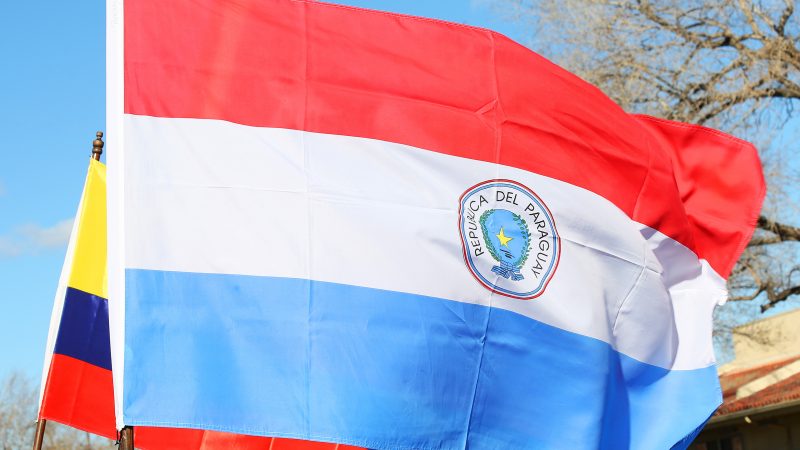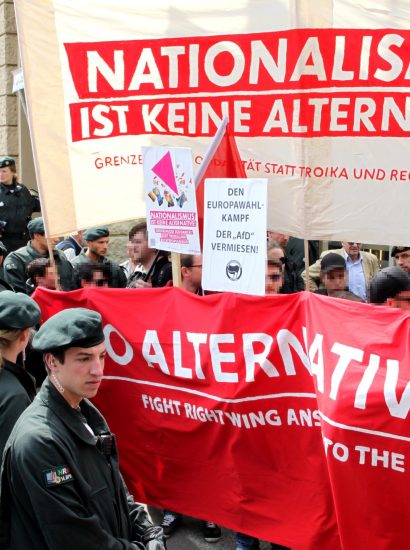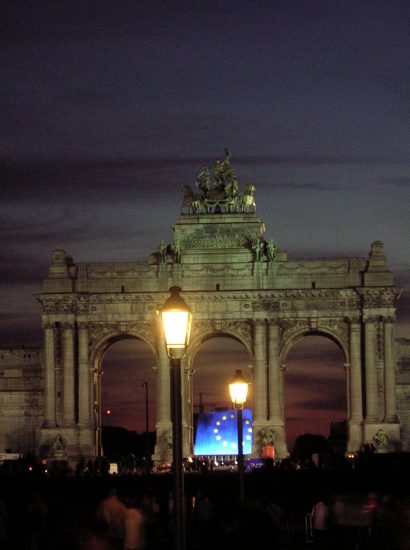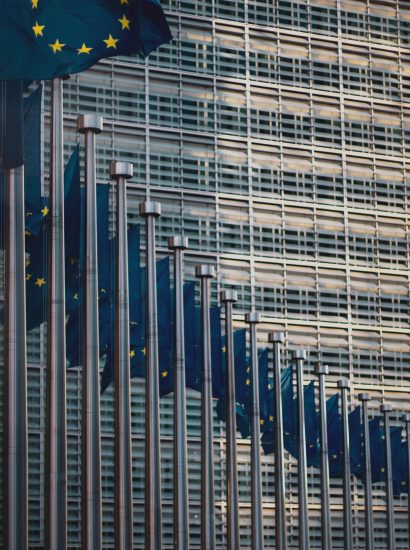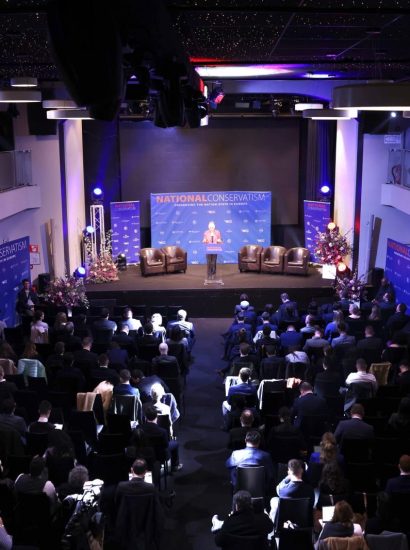Paraguay has been ruled by the National Republican Association – Colorado Party (Asociación Nacional Republicana – Partido Colorado, or ANR-PC for short) for decades. We could say that it is a typical Christian democratic party, with more capitalist and conservative factions. However, current President of the Latin American country Santiago Pena has presented himself as an alternative solution on the economic front. Pena was the finance minister during Horacio Cartes’s term in presidential office (2013-2018), playing a role that brought good policies to the country.
Family, Sovereignty, Jobs and Anti-Corruption: Promising Package from Santiago Pena
Even though Pena drags with the so-called continuismo of the Colorado Party, let’s remember that this party has been governing for 70 years uninterruptedly, except for the period of 2008 and 2012 where the left ruled. Despite that, Paraguay had democratic internal elections where Santiago Pena faced the official candidate of the government and won the internal elections after a great persecution and the interference of the US government (more on this later), he went on to the general elections and won with a wide majority. Likewise, Pena was presented as a technocrat, someone who beyond his ideas was going to make the country work as a young, conservative leader, faithful to his principles and an economist helped to reinforce the idea that he was not going to be someone else from the ANR.
According to Vanesa Vázquez, political analyst and one of the main advisors in the electoral campaign and of the current Paraguayan government, the main values of President Santiago Pena are family, life and sovereignty, the fight against poverty and the generation of jobs with the free market.
Three months ago, in an interview with CNN en Espanol he made it clear, “I belong to the conservative party, Paraguay is a conservative country, I am conservative. The value of family and the defense of life are central. Marriage can only be between a man and a woman.” On the economic issue, we could call him a capitalist or someone who is in favor of the free market with some regulation. He sees the economy for the pillar on which to build a conservative Paraguay, as the economy for him is the most important factor.
Like many Latin American countries, Paraguay has a lot of economic potential and that is something Pena aims to strengthen as well, to make this country internationally recognized for its economic prescriptions in the future, a country that will be an attractive destination for foreign investment. In short: create jobs. Energy prices are also of concern to the Paraguayan people; Pena has repeatedly said that one of his main objectives was to lower the prices of fossil fuels. Another big issue is the health issue. The Covid-19 pandemic wreaked havoc in Paraguay. One of President Pena’s goals will be to modernize the healthcare system and provide a larger budget (partly with the construction of five hospitals), as well as to bring the administration up to better standards.
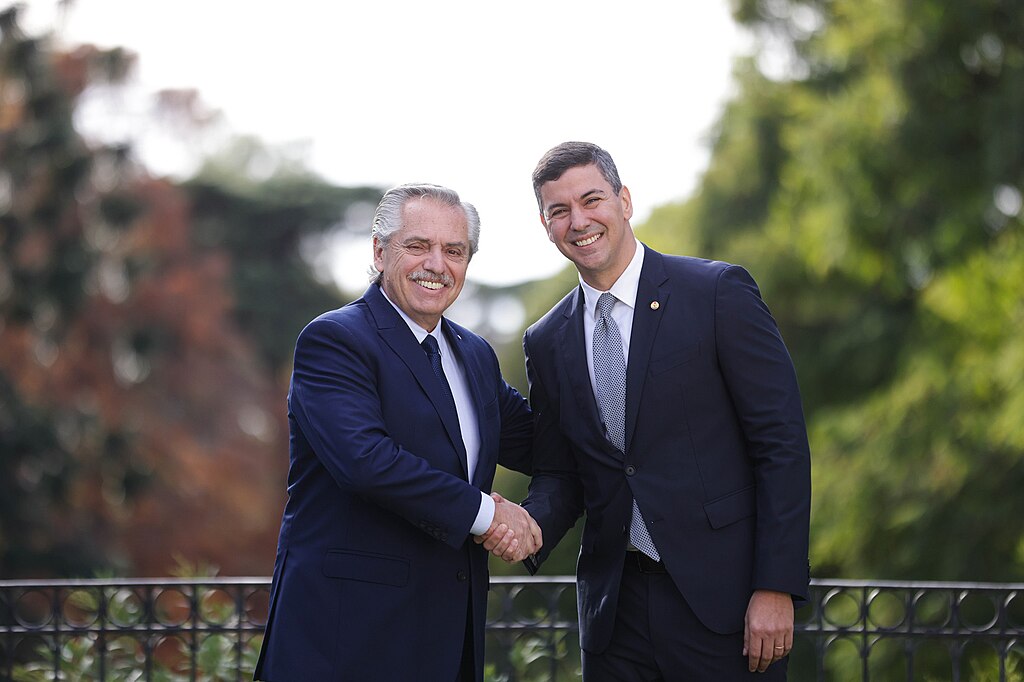
Argentine President Alberto Fernández (l) and president-elect of Paraguay, Santiago Peña, at a meeting at the Olivos Residence on May 29 2023. (Photo: Casa Rosada / Wikimedia Commons)
One of the last points that Pena has touched on is the fight against corruption in previous administrations, he wants to renew the party and put an end to all possible corruption that has occurred in the past and cut it so that it does not repeat in the future, making the Paraguayan trust towards the party improve considerably after the last scandals.
Despite the promises and programs, the elections were not at all as simple as they seemed.
The Controversial Paraguay Policy of the US: Asunción to Budapest?
According to reports, the United States administration exerted pressure on the leaders of the Colorado Party such as former President of the Republic and current President of the Colorado Party Horacio Cartes as well as the current Vice President who was a candidate by means of the Global Magnitsky Act. The Act authorizes the U.S. government to sanction those foreign government officials worldwide that are human rights offenders, freeze their assets, and ban them from entering the US. US Congresswoman María Elvira Salazar denounced that the Biden administration is interfering in Paraguay’s elections by sanctioning opponents of Efraín Alegre, who is a candidate of the Concertación Nacional. “The Biden administration is determined to support the left in Latin America. Their actions speak for themselves,” stated the Congresswoman in social media.
In addition, the United States sent as ambassador a diplomat who openly supports the LGBT movement and who has repeatedly repeated positions contrary to that of the Paraguayan country.
In an interview with Santiago Pena in Spanish newspaper El País, Pena said the following about this event: “It is no coincidence that this happened both in Paraguay and in a conservative country like Hungary. And yes, I think it generates uneasiness in different sectors, mainly in the most conservative ones. It can certainly be interpreted as a signal they want to give,” he said.
“We Paraguayans are from a traditional culture where we understand that the family is the center of society and the family is a traditional family, not only because it is what the Scriptures and the faith establish but also because it is in the Constitution,” added Pena.
International Relations: A No to Communist China, a Yes to European Conservativism
As Taiwan was one of the first countries to congratulate Paraguay, the question about Paraguay’s relationship with China springs into mind. According to Vanesa Vázquez, relations between Paraguay and the Republic of China (Taiwan) have been constant since the signing of the Agreement for the Establishment of Diplomatic Relations in July 1957.
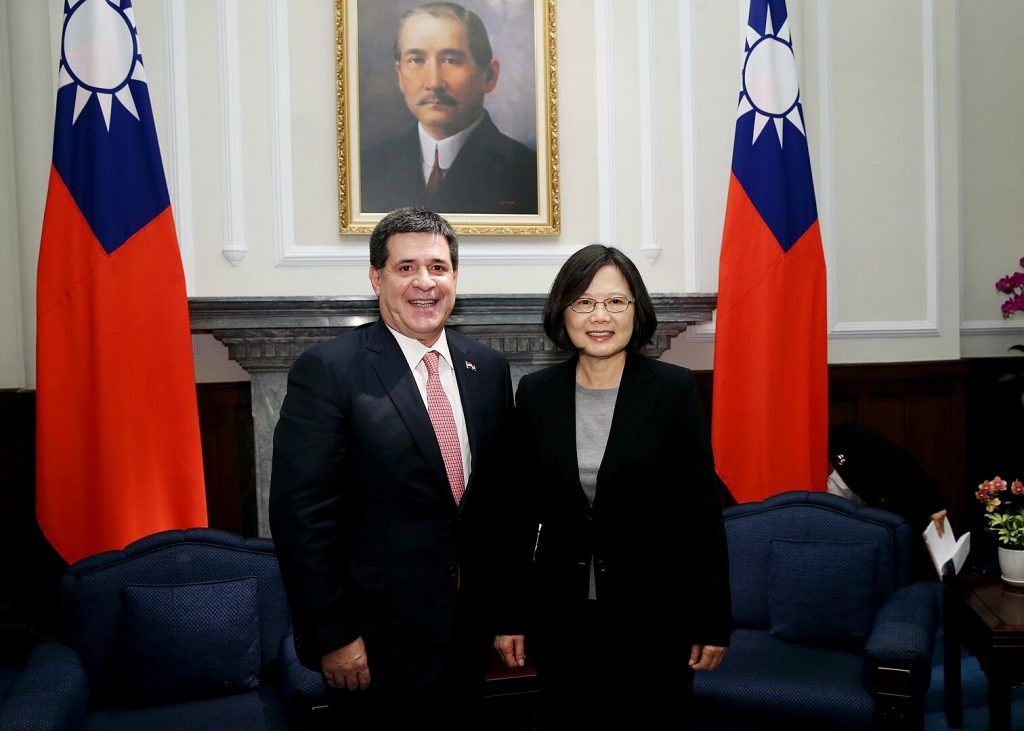
President of Paraguay Horacio Cartes and President of Taiwan Tsai Ing-wen in Taipei in 2016. (Photo by Taiwan Presidential Office / Wikimedia Commons)
Despite being one of the last South American countries to generate this bilateral bond, Paraguay currently represents Taiwan’s last link with the South American region, Paraguay is one of the few countries that does not have relations with Communist China.
Likewise, Paraguay is another of the few countries that wanted to move its embassy in Israel to Jerusalem, although months later they backed out. Pena continues to support the idea of finally moving the embassy to Jerusalem. Moreover, he believes that it is something that should be normalized, since all the institutions are in Jerusalem.
In relations with conservative parties Vanesa Vázquez said to The Long Brief, “We are in contact with the various parties. We have received support from members of the European Parliament, like Hermann Tertsch and Margarita de la Pisa from Vox (Spain), and we hope to continue strengthening our relations with the various conservative parties in Europe. It must be considered that we are a small country in Latin America, which makes it difficult for our relations with the large conservative parties in Europe, either because of their lack of knowledge or because of our small scope. Although we believe that in time we will be considered, seeing that we are one of the few countries in Latin America to defend true conservative values”.
In fact, they have great admiration in Hungary. Just last week, Raul Latorre, deputy of the Colorado party, met Hungarian President Katalin Novak with whom he took a picture uploading it to Twitter/X and saying “With the president of Hungary Katalin Novak, an example of building sovereignty and public policies in favor of the family.”
Con la presidente de Hungría Katalin Novák, un ejemplo de construcción de soberanía y políticas públicas a favor de la familia.
🇵🇾 🤝🇭🇺 pic.twitter.com/FkJUXXXAXW— Raul Latorre (@raulatorre) August 25, 2023
Santiago Pena’s Government to Reject EU Tutelage
Displaying a fierce claim to its financial independence, the lower house of Paraguay decided to repeal of Law 6659/20, an agreement signed between Paraguay and the European Union in 2020. With this decision that came this month, the initiative will be voted on by the Senate and if passed there, the agreement will be repealed.
Law 6659/20 is a governance framework by virtue of which Paraguayan education is placed under the tutelage of the European Union. The law approves the agreement with the European Union and the Republic of Paraguay for the program of support to the Educational Transformation of the educational system in Paraguay and its annexes. The agreement makes a donation of 38 million euros conditional on the Paraguayan educational system’s transversal implementation of gender equality, gender focus, rights-based approaches and environmental protection and climate change mitigation.
On the reasons behind the initiative to step back from the agreement, Vázquez told us, “[Law 6659/20] is an inadmissible surrender of Paraguay’s educational sovereignty in favor of the European Union. People went out to demonstrate and the patriotic representatives of the Congress voted for the repeal in the Chamber of Deputies with an absolute majority of 70 votes in favor of the repeal and against 6.”

